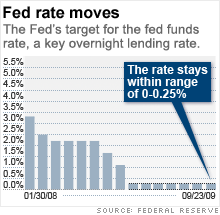Fed believes recovery is here
Minutes of Sept. 22-23 meeting show most members now believe recession is over -- even if they see modest growth, a weak job market and low wages going forward.

NEW YORK (CNNMoney.com) -- Most Federal Reserve policymakers believe that an economic recovery has started, although they view the turnaround as weak enough that some want the central bank to take additional steps to stimulate the economy, according to minutes of a meeting last month that were released Wednesday.
The minutes of the two-day meeting, concluded Sept. 23, were the most explicit statement yet that the Federal Open Market Committee now believes the recession that started in December 2007 is over. The committee comprises the group of Fed governors and district bank presidents who set interest rates and take other steps to spur or slow economic growth.
"Most thought an economic recovery was under way," the minutes stated. "Many participants noted that since August, they had revised up their projections for the second half of 2009 and for subsequent years."
Up to now, the Fed's statements have been more circumspect. Its statement , released at the end of the meeting, said simply that economic readings suggest "that economic activity has picked up following its severe downturn."
This is the first time that Fed minutes explicitly said that most members believe the recession is over. However, in response to a question in an appearance at the Brookings Institution last month, Fed Chairman Ben Bernanke did say that the recession is "very likely over."
The decision on when a recession begins and ends is not up to the Federal Reserve, but instead the National Bureau of Economic Research. That group doesn't make any sort of declaration until months after the fact, in order to take into account final readings of various economic measures such as employment, income and industrial production.
For example, the NBER didn't declare that the recent recession had begun in December 2007 until a full year after the fact.
There is a growing consensus among outside economists that the recession is over. A survey of top forecasters by the National Association for Business Economics earlier this month found 81% believe the economy is in recovery.
Still, there was debate at the Fed's September meeting about what to do next. There was broad agreement that the fed funds rate, the key rate used to pump money into the economy, should be kept near 0%, and that the statement should say "economic conditions are likely to warrant exceptionally low levels of the federal funds rate for an extended period."
But some members wanted to increase the amount of mortgages the Fed will buy from the $1.25 trillion level that had been previously announced. The Fed is buying up those mortgages in an effort to keep mortgage rates low.
At least one member wanted to instead cut the amount of mortgages purchased before reaching that level.
The members agreed that the job market is likely to stay weak for the foreseeable future -- and that is likely to keep wages from rising.
But there was a "a range of views" among members about how soon inflation would reappear as a result of trillions that the Fed has pumped into the economy in the last year.
Bernard Baumohl, executive director of the Economic Outlook Group, said he thinks there is a "vigorous debate" going on right now within the Fed as to when it should take steps to pull out the money it has pumped into the economy.
"If we're getting signs that the recession is over and recovery is gathering steam, the Fed is going to have to move very quickly to begin to withdrawal the stimulus, or else it will sow the seeds for inflation," he said.
Even with the debate about purchases of mortgages and the threat of inflation, there appears to be general agreement that the recovery is likely to be modest.
"Despite...positive factors, many participants noted that the economic recovery was likely to be quite restrained," according to the minutes. ![]()


